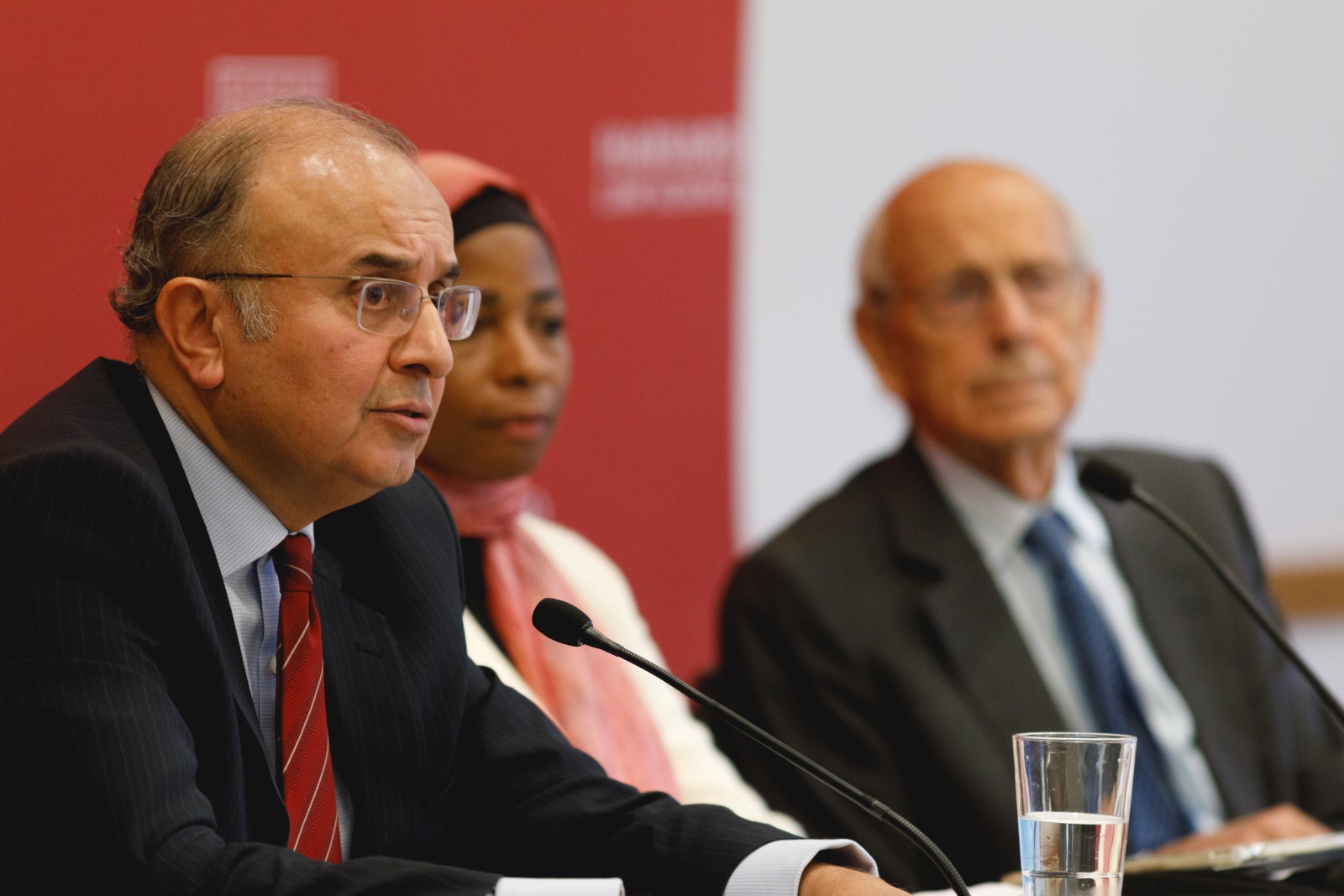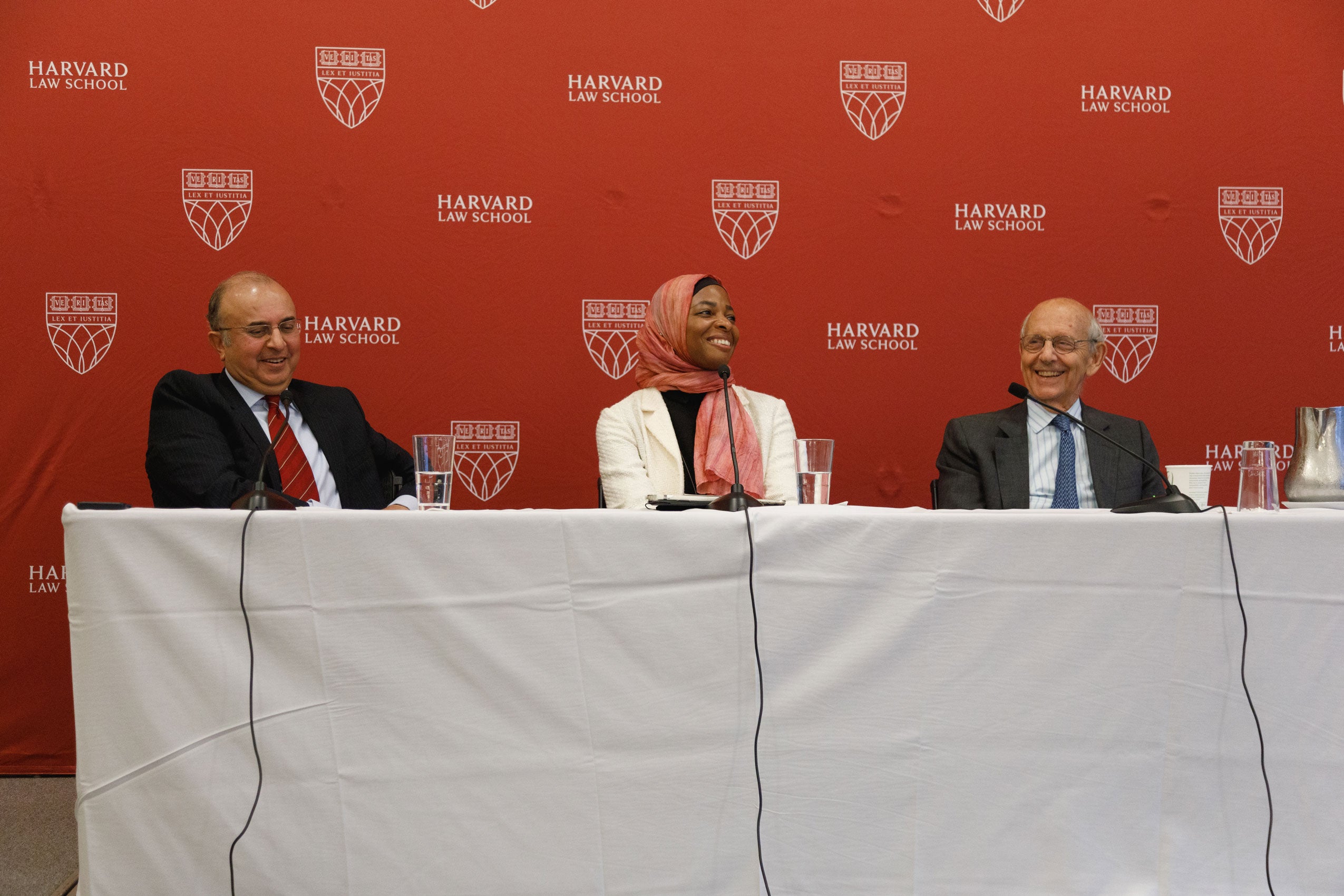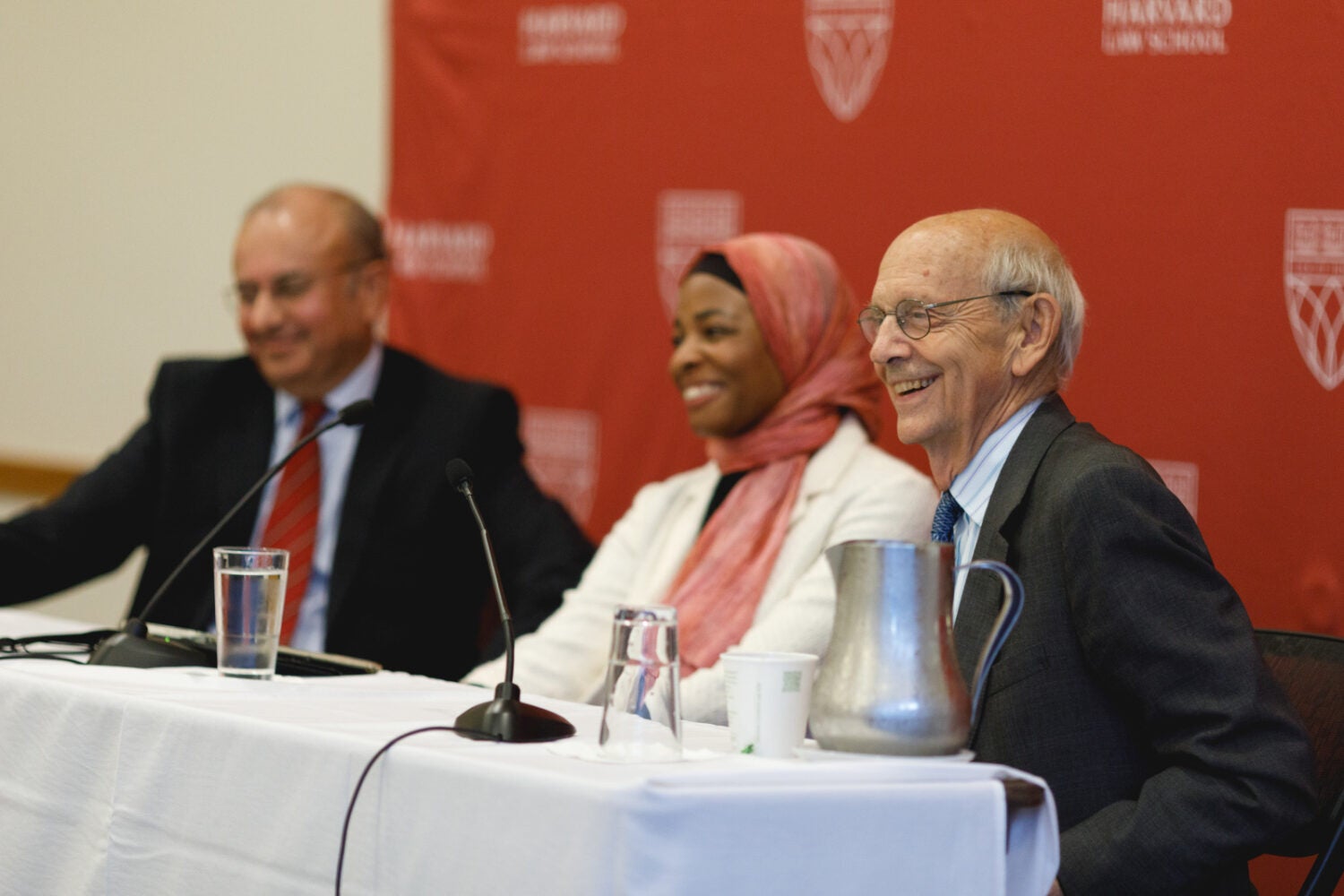An audience from Harvard Law School and across the university gathered to hear “Reflections on Interpretation and Serving in the Judiciary” from Justice Stephen G. Breyer ’64, who retired this year after 28 years on the U.S. Supreme Court, and returned to HLS as Byrne Professor of Administrative Law and Process, and Justice Syed Mansoor Ali Shah, who has been serving on the Supreme Court of Pakistan since 2018. The Sept. 19 event was moderated by Harvard Law Professor Intisar Rabb, director of the Program in Islamic Law at Harvard Law School. In their discussion, which ranged from the judicial process to responses to the COVID-19 pandemic and the devastating floods in Pakistan, the justices found common ground — and even a few opportunities for dissent.
Rabb began by inviting the justices to describe what led them to their respective courts. Breyer, who served on the U.S. Court of Appeals for the First Circuit from 1980 to 1994, likened his nomination to the Supreme Court to “picking the gold ring in the merry-go-round.” Referencing a quote from Leo Tolstoy, he noted “It doesn’t matter how you’re selected. What matters is what you do after you are selected. That’s what counts.”
Shah served for nine years on the High Court of Lahore and became its chief justice before being elevated to the Supreme Court. In 2007, he explained, lawyers in Pakistan started a protest, popularly known as the Lawyers’ Movement, after the military removed the then chief justice and other members of the Supreme Court from office. Two years later, when the court had been restored, Shah and other activist lawyers were encouraged to join the bench.

“If you really want to fight for democracy, the Chief Justice said to me, the best way to do it is to be a judge,” he recalled.
Pakistan’s constitution, he explained, focuses on fundamental rights. The justices can strike down legislation or compel the government to take certain actions. In addition, Pakistan is an Islamic Republic: its constitution is one of about two dozen constitutions that designate sharī ͑a or Islamic law as a source of state law, which also guides the work of the court.
Shah observed that his work on the court has been a very gratifying experience; “Given another life, I would love to be a judge again.” Breyer concurred. “You have a problem in front of you that matters to people … [and] therefore you have to give it your best. … And as you get older, you realize what a privilege that is, to have a job where you must behave in that way.”
Shah added that being a judge in South Asia carries additional challenges. “Normally when you look for a judge, you look for competence, creativity … and all that. But I think we need to look for another factor … because the kind of pressures a judge in South Asia deals with might not be the same here. … That courage, that audacity and that strength that’s required in a judge is normally very difficult to find. You’re not trained in the art of bravery or courage. … It’s not easy speaking truth to power.”
There were moments of levity as well. Shah noted that Pakistan does not have systems in place for arbitration or mediation, so every case ends up in court. The country’s Supreme Court, which has 17 justices, hears about 15,000 cases a year. The U.S. Supreme Court, by contrast, hears about 70 cases annually. After Breyer offered a succinct outline of how a case comes before the U.S. Supreme Court, and how it is decided, Shah’s response — “We don’t have that much time, and the luxury of those [law] clerks, and all those memos, but we still get it right in the end” — earned a burst of laughter from the panel and audience.
Shah also discussed “suo moto” cases. The term — which means “on your own motion” — refers to a unique jurisdiction that Pakistan’s Supreme Court enjoys. “You don’t have to have a case or a petition before you; if you think there are fundamental rights of public importance being affected, the court on its own can take up a matter.” He presented examples, such as addressing the harsh working conditions faced by laborers in a brick kiln.

When Rabb wondered about criticism of the U.S. Supreme Court’s “emergency docket” for deciding cases that have not been fully briefed before it, Breyer explained that on occasion the mechanism is necessary. He noted that a temporary injunction can be used to prevent harm, observing that the past few years gave rise to issues with regard to COVID vaccinations and that, although the justices’ views on the merits varied, they recognized the time-sensitive nature of the cases.
Rabb, who teaches criminal law, asked Breyer if he had any advice for a lawyer seeking to address structural questions, citing the Supreme Court’s affirmation of a court-ordered prison population limit in Brown v. Plata as an example. Breyer found an opportunity for a comparison. In Pakistan, he observed, “it’s easier to get to the heart of the issue, which usually has to do with a constitutional value, or a common sense value,” as opposed to a tendency “to push issues into a format where you get rules.” It’s an important distinction, he maintained, urging lawyers to think about it and work it out in their own minds.
Rabb concluded by asking the justices what guidance they might give to a young lawyer who planned to argue before a court, or perhaps become a judge. Breyer’s advice, passed along by his father, was “Do your job, as best you can,” adding “and when you’re doing it, listen to what other people say, too. It isn’t such a bad thing, when you have an opinion, to find someone who has the opposite opinion, and then talk to them about it.”
And taking a question from the audience, Rabb asked if there were ways that judges could come together to build consensus in the midst of seemingly intractable arguments. “The construct [in Pakistan] is that everybody is independent, and everybody takes an opinion on the matter,” Shah observed. “We tend to gain consensus if possible, to talk and reason with each other, but at the end of the day … one has to stand up to one’s own conscience, and one’s own understanding of the law. … If everyone stands up independently, the culture of dissent is beautiful … and it should be retained.”
Breyer took a slightly different stance. “I think my dissents are failures … not complete failures, because people will listen, to some degree.” Recalling advice he received from Senator Ted Kennedy, he urged people to listen to the other side’s arguments, find an idea they can work with, and compromise when possible. “The question is when, up to what point? … Better to get 30 to 40% of what you want, than 100% of nothing.”
The event was sponsored by International Legal Studies and The Program in Islamic Law, Harvard Law School, and the Lakshmi Mittal and Family South Asia Institute, Harvard University.
